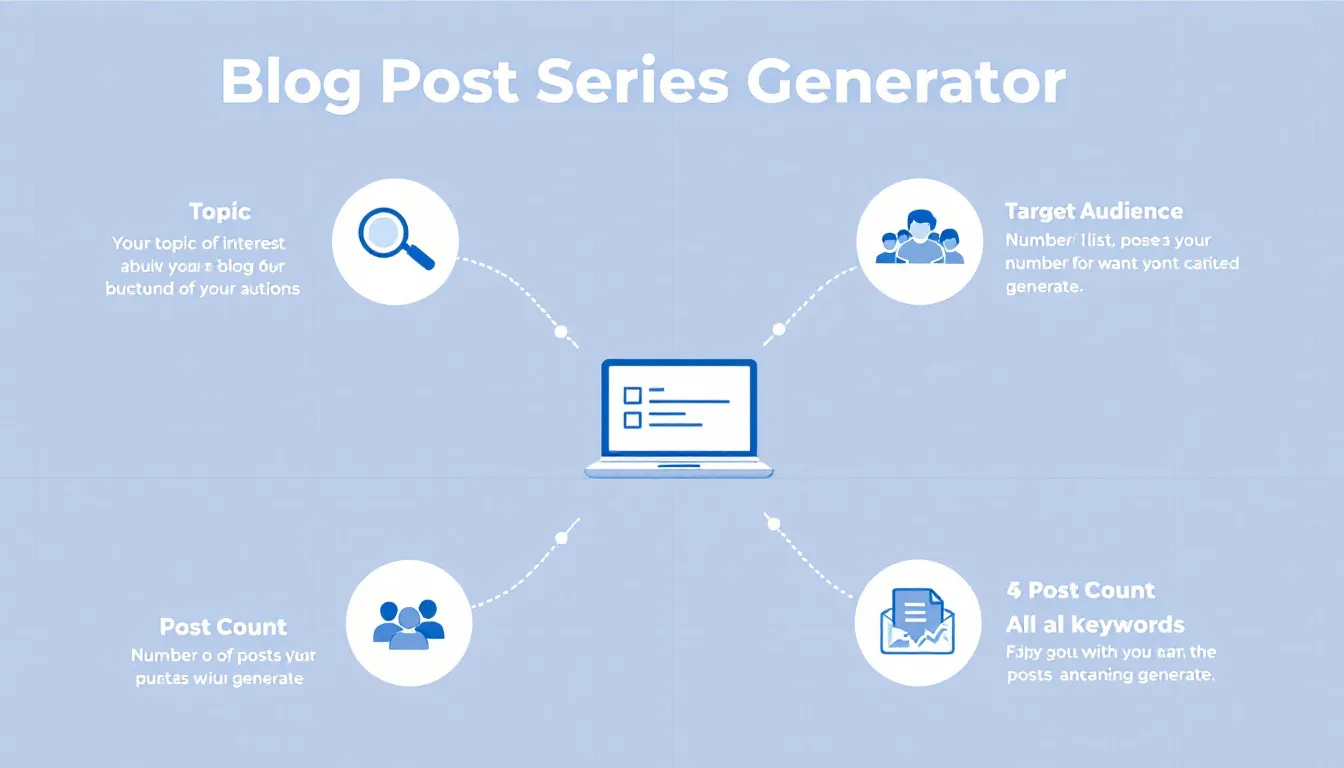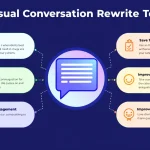Is this tool helpful?
How to Use the Blog Post Series Generator Effectively
This powerful tool helps content creators generate strategic blog post series ideas. Here’s a step-by-step guide to using each field effectively:
1. Main Topic or Subject Area
Enter your primary topic. For example:
- Sustainable Living and Eco-Friendly Practices
- Artificial Intelligence in Healthcare
2. Target Audience
Specify who you’re writing for. Examples:
- Tech-savvy millennials interested in sustainable lifestyle changes
- Healthcare professionals adapting to technological advancements
3. Number of Blog Posts
Select between 1-10 posts. The recommended default is 5, which typically provides enough depth while maintaining reader engagement.
4. Key Terms and Phrases
Input relevant keywords. For example:
- For sustainable living: “zero-waste, carbon footprint, renewable energy”
- For healthcare AI: “machine learning, patient care, diagnostic tools”
5. Writing Tone and Style
Define your preferred tone. Examples:
- Authoritative yet accessible
- Research-backed with practical applications
Understanding the Blog Post Series Generator
This innovative tool is designed to help content creators, marketers, and business owners develop cohesive, strategic blog post series that engage readers and provide comprehensive coverage of specific topics. It combines user input with intelligent content planning to generate organized, thematic blog post ideas that flow naturally from one topic to the next.
Core Features and Capabilities
- Topic exploration and development
- Audience-focused content planning
- Keyword integration
- Tone consistency guidance
- Series structure optimization
Benefits of Using the Blog Post Series Generator
1. Strategic Content Planning
The tool helps create structured content plans that:
- Build topical authority
- Enhance SEO performance
- Maintain consistent publishing schedules
- Create interconnected content pieces
2. Time and Resource Optimization
Users can save significant time by:
- Automating ideation processes
- Reducing brainstorming sessions
- Streamlining content calendars
- Maintaining topic coherence
3. Enhanced Reader Engagement
The tool helps create content that:
- Keeps readers coming back for more
- Builds anticipation for upcoming posts
- Creates natural content progression
- Addresses comprehensive topic coverage
Solving Content Creation Challenges
Common Problems Addressed
The generator effectively solves several content creation challenges:
1. Topic Fragmentation
Instead of disconnected posts, the tool creates cohesive series that build upon each other. For example, a financial literacy series might progress from:
- Basic budgeting fundamentals
- Emergency fund establishment
- Investment principles for beginners
- Advanced wealth-building strategies
- Estate planning essentials
2. Audience Alignment
The tool ensures content matches reader needs and interests. Example series for new entrepreneurs:
- Business plan development
- Market research techniques
- Funding options exploration
- Legal considerations
- Marketing strategy basics
Practical Applications and Examples
Example 1: Fitness and Wellness Blog Series
Input:
- Topic: Fitness for Beginners
- Target Audience: Newcomers to exercise
- Keywords: workout basics, fitness fundamentals, exercise safety
- Tone: Encouraging and supportive
Generated Series:
- Getting Started: Essential Fitness Equipment for Beginners
- Understanding Your Body: Basic Movement Patterns
- Creating Your First Workout Plan
- Nutrition Basics for New Fitness Enthusiasts
- Progress Tracking and Goal Setting
Example 2: Digital Marketing Strategy Series
Input:
- Topic: Social Media Marketing
- Target Audience: Small business owners
- Keywords: social strategy, engagement, ROI
- Tone: Professional but practical
Generated Series:
- Choosing the Right Social Media Platforms
- Creating Engaging Content That Converts
- Building and Growing Your Community
- Paid Social Media Advertising Basics
- Measuring Success and Adjusting Strategy
Frequently Asked Questions
Q: How many blog posts should I include in a series?
The ideal number depends on your topic depth and audience needs. Five posts typically allow comprehensive coverage while maintaining reader interest. Consider your topic’s complexity and your audience’s attention span.
Q: Should all posts in a series be published simultaneously?
It’s generally better to space out posts, publishing them consistently (e.g., weekly) to maintain reader engagement and allow time for promotion between posts.
Q: How can I make my blog series more engaging?
Include practical examples, case studies, and actionable tips. Use visual content, encourage reader interaction, and maintain consistent quality across all posts.
Q: Can I use the generator for different content types?
Yes, the tool can be adapted for various content formats, including how-to guides, educational series, case studies, and industry analyses.
Q: How should I promote my blog series?
Promote each post individually while highlighting the series connection. Use social media, email newsletters, and internal linking between posts to maximize visibility.
Q: What makes a blog series successful?
Success factors include consistent quality, logical progression of topics, valuable insights, regular publishing schedule, and strong promotion strategy.
Important Disclaimer
The calculations, results, and content provided by our tools are not guaranteed to be accurate, complete, or reliable. Users are responsible for verifying and interpreting the results. Our content and tools may contain errors, biases, or inconsistencies. We reserve the right to save inputs and outputs from our tools for the purposes of error debugging, bias identification, and performance improvement. External companies providing AI models used in our tools may also save and process data in accordance with their own policies. By using our tools, you consent to this data collection and processing. We reserve the right to limit the usage of our tools based on current usability factors. By using our tools, you acknowledge that you have read, understood, and agreed to this disclaimer. You accept the inherent risks and limitations associated with the use of our tools and services.







